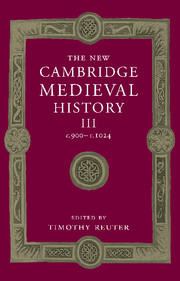Book contents
- Frontmatter
- 1 Introduction: reading the tenth century
- PART I GENERAL THEMES
- PART II POST-CAROLINGIAN EUROPE
- 9 The Ottonians as kings and emperors
- 10 Saxony and the Elbe Slavs in the tenth century
- 11 Bavaria in the tenth and early eleventh centuries
- 12 Lotharingia
- 13 Burgundy and Provence, 879–1032
- 14 The kingdom of Italy
- 15 West Francia: the kingdom
- 16 West Francia: the northern principalities
- 17 Western Francia: the southern principalities
- 18 England, c. 900–1016
- PART III NON-CAROLINGIAN EUROPE
- Appendix genealogical tables
- List of primary sources
- Bibliography of secondary works arranged by chapter
- Index
- Frontispiece
- Plate section
- Map 2: Archbishoprics and bishoprics in the early eleventh century
- Map 4: Germany
- Map 13: Byzantium in 1025
- References
18 - England, c. 900–1016
from PART II - POST-CAROLINGIAN EUROPE
Published online by Cambridge University Press: 28 March 2008
- Frontmatter
- 1 Introduction: reading the tenth century
- PART I GENERAL THEMES
- PART II POST-CAROLINGIAN EUROPE
- 9 The Ottonians as kings and emperors
- 10 Saxony and the Elbe Slavs in the tenth century
- 11 Bavaria in the tenth and early eleventh centuries
- 12 Lotharingia
- 13 Burgundy and Provence, 879–1032
- 14 The kingdom of Italy
- 15 West Francia: the kingdom
- 16 West Francia: the northern principalities
- 17 Western Francia: the southern principalities
- 18 England, c. 900–1016
- PART III NON-CAROLINGIAN EUROPE
- Appendix genealogical tables
- List of primary sources
- Bibliography of secondary works arranged by chapter
- Index
- Frontispiece
- Plate section
- Map 2: Archbishoprics and bishoprics in the early eleventh century
- Map 4: Germany
- Map 13: Byzantium in 1025
- References
Summary
the more that is known of any period in the history of Anglo-Saxon England, the more we can appreciate the limitations of our knowledge. A framework for the momentous events of the tenth century is provided by the Anglo-Saxon Chronicle; charters, law-codes and coins supply detailed information on various aspects of royal government, and much else besides; and the surviving works of Anglo-Latin and vernacular literature, not to mention the numerous manuscripts written in the tenth century, testify in their different ways to the vitality of ecclesiastical culture. Yet it does not follow that the tenth century is better understood than more sparsely documented periods: the evidence may allow great scope for the kind of detailed analysis on which generalisations must depend, but at the same time it generates supplementary questions which expose how much remains beyond our reach.
It is easy enough to identify the themes which seem in retrospect to give shape to the period under review, though it must be emphasised that the themes are interwoven to such an extent that it is unwise to treat any one of them in isolation from the others. During the course of the tenth century the West Saxon kings extended their power first over Mercia, then into the southern Danelaw, and finally over Northumbria, thereby imposing a semblance of political unity on peoples who remained conscious nonetheless of their respective customs and their separate pasts. From time to time, the kings also received the submission of certain Welsh and Scottish rulers. The prestige and the pretensions of the monarchy increased, the institutions of royal government were strengthened, and kings and their agents sought in various ways to establish social order. England was brought into closer contact with the mainstreams of the European world; religious learning and the decorative arts were stimulated by the importation of manuscripts from the continent, and in certain quarters there was new zeal for organised monastic life.
Keywords
- Type
- Chapter
- Information
- The New Cambridge Medieval History , pp. 456 - 484Publisher: Cambridge University PressPrint publication year: 2000
References
- 2
- Cited by

